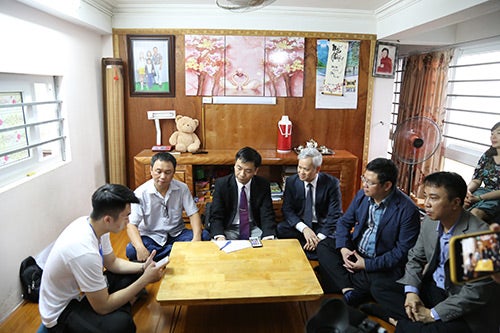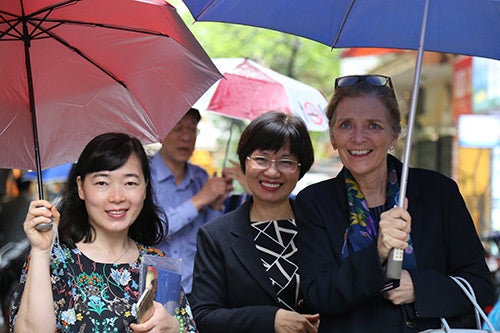News
Digital revolution comes to Viet Nam census
- 19 April 2019
News
HA NOI, VIET NAM – At the start of April, more than 122,000 people fanned out across Viet Nam, pursuing information about every single person in the country. They are enumerators for the country’s housing and population census – one of the largest and most complex peacetime exercises a nation can undertake.
Tran Ba Tho is one of those enumerators. Normally a university student in Ha Noi, Mr. Tho is diverting his efforts to this monumental, once-in-a-decade undertaking.
Today is a special day for Mr. Tho. After extensive training, he is finally going door-to-door to gather a treasure trove of facts and statistics.
“My name is Tran Ba Tho,” he announced at one household, with typical formality and courtesy. “The purpose of my visit is to interview you in order to get information for the 2019 census.”

“Please, come in and take a seat,” Chu Ba Diep replied, inviting him inside, along with the large retinue of officials who were accompanying him. Mr. Tho had been randomly selected for observation by a monitoring team of government and UNFPA personnel.
Mr. Tho made sure the resident understood the purpose of the census, then proceeded: “Could you let me know full name of each person who has usually resided in the household for 6 months or more as of 0 hour 1 April 2019?”
It was only the beginning of a long interview designed to elicit detailed demographic, social and economic information. Throughout the interaction, Mr. Tho carefully entered each response into his smart phone, making sure no mistakes were made.
Viet Nam’s census, to be conducted throughout the country from the 1 to 25 April, will be the largest ever since the nation’s formation, carried out in all 63 provinces and cities. It will count approximately 94 million people and 26.2 million households. On top of the many thousands of enumerators, there are 9,300 supervisors.

The operation, conducted by the General Statistics Office with support from UNFPA, will allow the country to see how the population has changed, not only in size but also in structure, accounting for factors such as fertility, mortality, migration, education, employment, disability and housing conditions.
This huge dataset is essential for creating policies and making investments that meet the needs of communities, foster prosperity, and secure the rights and well-being of all people.
Training courses, seminars and conferences to prepare for the census were held continuously from July 2017. These preparations were necessary because, for the first time, the country’s enumerators are equipped with tablets and smart phones to collect data digitally. Households can also provide information to the census website.
UNFPA is supporting these efforts, which will improve the quality and transparency of the data collected and shorten the time needed for data processing.
UNFPA has helped other countries digitize their census operations. “Across the world, some countries are leading this global trend, and Viet Nam is now joining them. I am sure we all feel very proud to be part of this revolutionary move,” said Astrid Bant, UNFPA’s representative in Viet Nam.
Even with the technological advances, the day-to-day work can be challenging, as enumerators like Mr. Tho attest.
“It is not easy to find people at home,” he said. “During working hours it is difficult to arrange interviews. I usually have to meet heads of households at noon and in the evenings. Very often, I have gone up to three or four times to the same household.”

On top of that, some people have had difficulty remembering the calendar month and year they were born. Mr. Tho prompts them to remember historical moments that took place around their births. Other times, they only remembered the season when they were born.
But these heroic efforts to make sure everyone is counted will pay off as officials and policymakers gain a clearer picture of the country’s people and needs.
“Producing and making good use of quality census data, we can make a difference for better lives of all the people, and make sure no one is left behind,” said Ms. Bant.
In addition to supporting the piloting of digital census technology, UNFPA assisted with the census plan, sampling design, questionnaires and manuals, trainings and advocacy activities.
Preliminary results will be announced in July 2019, and the final results will be published in the second quarter of 2020.
– Nguyen Thi Hong Thanh